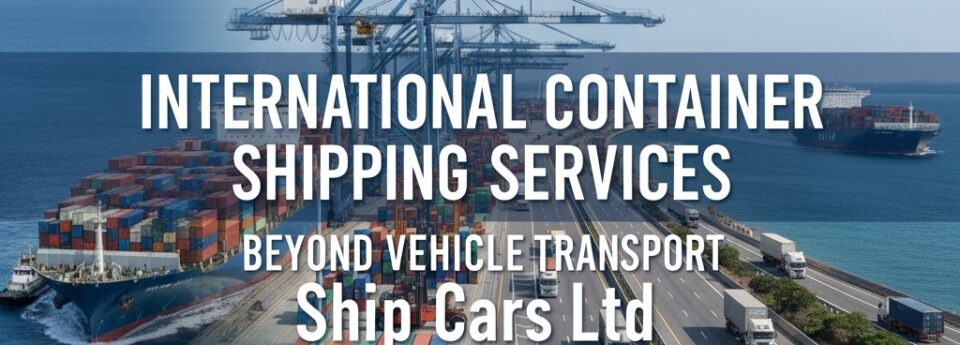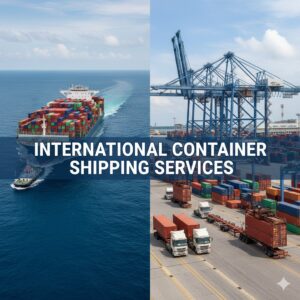
International Container Shipping Services | Beyond Vehicle Transport | Ship Cars Ltd
At Ship Cars Ltd., our expertise extends beyond just shipping vehicles. We offer comprehensive international container shipping services, providing a secure, reliable, and efficient solution for transporting a wide array of goods and cargo across the globe. Whether you’re a business looking to move commercial goods, an individual relocating personal effects, or require specialised transport for machinery or equipment, our container shipping solutions are tailored to meet your specific needs. We handle full container loads (FCL) and can also explore options for less than a container load (LCL) through our network. Ship Cars Ltd
Comprehensive Container Shipping Solutions
We understand that every shipment is unique. Our goal is to provide a flexible and dependable service that covers the entire shipping process, from initial consultation to final delivery.
- Full Container Load (FCL):
- Ideal For: Larger shipments, commercial goods, high-value items, or when you require exclusive use of a container for maximum security and control.
- Process: You hire an entire shipping container (20ft, 40ft, or 40ft High Cube). The container is delivered to your location for loading, or you can arrange for loading at a port or depot. Once packed and sealed, it is transported to the departure port and loaded onto a vessel for its international journey.
- Benefits:
- Security: Your goods remain sealed within the container for the entire transit, minimising handling and risk of damage or theft.
- Speed: Generally faster transit times as the container is loaded and dispatched without waiting for other shipments.
- Control: You have full control over the packing and sealing process.
- Cost-Effectiveness: For larger volumes, FCL is often more economical per unit of cargo than LCL.
- Less Than a Container Load (LCL):
- Ideal For: Smaller shipments, individuals sending personal effects, or businesses with consolidated cargo that doesn’t fill an entire container.
- Process: Your goods are consolidated with other compatible shipments in a shared container at a designated depot or warehouse. Once the container is full, it is shipped internationally. At the destination, the container is deconsolidated, and your goods are dispatched.
- Benefits:
- Cost Savings: You only pay for the space your goods occupy, making it an economical option for smaller shipments.
- Flexibility: Suitable for a wide range of items and volumes.
- Considerations: LCL shipments involve more handling (consolidation and deconsolidation), which can slightly increase transit times and the risk of damage if not packed adequately.
Container Types:
We work with standard container sizes to accommodate various cargo needs:
- 20ft Standard Dry Van: Suitable for smaller FCL shipments or consolidated LCL cargo. Offers approximately 33 cubic metres of space.
- 40ft Standard Dry Van: For larger FCL shipments. Offers approximately 67 cubic metres of space.
- 40ft High Cube (HC): Provides extra height, offering approximately 76 cubic metres of space, ideal for taller items or maximising volume.
- Refrigerated Containers (Reefers): For temperature-sensitive cargo such as perishable goods, pharmaceuticals, etc. (subject to availability and specific routing).
- Open Top / Flat Rack Containers: For oversized or awkwardly shaped cargo that may not fit standard containers (subject to specific project management and routing).
For more details you can read Essential UK Car Shipping Rules You Need to Know.
What Can You Ship in a Container?
Our international container shipping services are designed for a vast array of goods, including but not limited to:
- Commercial Goods:
- Manufactured products
- Retail stock
- Electronic components
- Textiles and apparel
- Machinery and industrial equipment
- Building materials
- Furniture and home goods
- Personal Effects:
- Household items during international relocation
- Personal belongings
- Bicycles, motorcycles (if not part of vehicle shipping regulations)
- Sporting equipment
- Specialised Cargo:
- Art and antiques (requiring specialised packing)
- Exhibition and event materials
- Palletised goods
- Boxes and crates
- Drums and barrels (if safely secured and approved)
Important Note: While we handle a broad range of cargo, certain items are restricted or prohibited due to international shipping regulations, customs laws, or safety concerns. Please refer to our section on prohibited items for details.
To read more about what RoRo shipping is.
The Container Shipping Process Explained

We aim to make the international shipping process as transparent and straightforward as possible.
- Consultation and Quotation:
- Understanding Your Needs: We begin by discussing your cargo, its dimensions, weight, destination, and any specific requirements (e.g., temperature control, urgency).
- Transparent Pricing: We provide a detailed quotation covering freight charges, port fees, documentation, and any other applicable costs.
- Booking and Documentation:
- Container Allocation: We secure the appropriate container size and type for your car shipping services.
- Required Documents: You will need to provide commercial invoices, packing lists, and any specific certificates related to your cargo (e.g., for hazardous materials, food products).
- Bill of Lading (BOL): We issue the BOL, which serves as a contract of carriage, receipt of goods, and title document.
- Cargo Loading and Securing:
- At Your Location: If using FCL, the container can be delivered to your premises for you to load and secure your goods. Our team can offer advice on best practices for securing cargo to prevent movement during transit.
- At Port/Depot: Alternatively, you can arrange for your goods to be delivered to a port or depot for professional loading and lashing by our partners.
- LCL Consolidation: For LCL, your goods will be expertly consolidated with other shipments at our consolidation hub.
- Transit:
- Port Handling: The loaded container is transported to the departure port and loaded onto the vessel.
- Ocean Voyage: The container travels to the destination port via scheduled sea routes. We provide tracking updates where available.
- Customs Procedures: Pre-arrival customs declarations are filed at the destination country.
- Destination and Customs Clearance:
- Arrival: The container arrives at the destination port.
- Customs Formalities: Import declarations are processed, and applicable duties and taxes are paid. We can assist with this process or liaise with your appointed customs broker.
- Deconsolidation (LCL): For LCL shipments, the container is opened, and individual shipments are sorted.
- Final Delivery:
- Collection: You can arrange to collect your goods from the destination port or depot.
- Drayage: We can arrange for the container to be transported (drayed) to your business or residence for unloading.
- Final Mile Delivery: For LCL shipments, your goods will be delivered to your specified address.
You may also get benefit from reading How To Choose Right Car Shipping Method.
International Shipping Regulations and Compliance
Shipping goods internationally requires strict adherence to various regulations:
- Customs Declarations: Accurate declaration of goods, their value, and origin is mandatory for all international shipments.
- Import Duties and Taxes: Each country has its own tariff schedule. Duties and taxes are calculated based on the Harmonised System (HS) code of the goods, their value, and origin.
- Prohibited and Restricted Items: Many items are banned or require special permits for import or export. This includes:
- Hazardous Materials (HAZMAT): Chemicals, flammable substances, explosives, certain batteries require specific documentation, handling, and are often restricted or banned.
- Weapons and Ammunition: Strictly regulated and usually prohibited.
- Illegal Substances: Narcotics, counterfeit goods.
- Certain Foodstuffs and Agricultural Products: May be subject to strict import controls and quarantine.
- Cultural Artifacts and Endangered Species: Often require special permits or are prohibited.
- Lithium Batteries: Even if not part of a vehicle, these have specific shipping regulations depending on their type and quantity.
- Documentation Requirements: Commercial Invoice, Packing List, Certificate of Origin, and specific licenses or permits may be required depending on the cargo and destination.
- Country-Specific Regulations: Each country has unique import rules, labelling requirements, and inspection protocols.
Ship Cars Ltd. advises all clients to familiarise themselves with the import regulations of the destination country and to declare all cargo accurately. We can provide guidance based on common trade routes, but ultimate responsibility for compliance rests with the shipper.
Insurance and Risk Management
While containers offer a high level of security, international transit always involves inherent risks. We strongly recommend comprehensive marine insurance for all shipments.
- Marine Cargo Insurance: Protects against loss or damage to your goods during transit from perils such as:
- Collision or grounding of the vessel
- Fire or explosion
- Theft
- Natural disasters (storms, floods)
- Damage during loading/unloading or transit.
- Coverage Options: We can help you arrange insurance tailored to your cargo’s value and nature. Options typically include:
- All-Risks Cover: The most comprehensive option, covering a wide range of potential losses.
- Specified Perils Cover: Covers only the risks explicitly listed in the policy.
- Valuation: Insurance coverage is based on the declared value of the goods, typically the commercial invoice value plus shipping and insurance costs.
It is crucial to declare the correct value of your goods for insurance purposes. We can provide detailed information on obtaining adequate cover for your specific shipment.
Costs Associated with Container Shipping
The total cost of international container shipping is influenced by several factors:
- Freight Charges: The base cost of sea transport, determined by container type, size, route, and current market rates.
- Container Type and Size: 40ft HC containers are generally more expensive than 20ft standard containers. Specialised containers (reefers) also incur higher costs.
- Port Handling Fees (THC – Terminal Handling Charges): Fees charged by ports at both the origin and destination for loading, unloading, and terminal services.
- Documentation Fees: Costs for issuing Bills of Lading, customs declarations, and other necessary paperwork.
- Customs Duties and Taxes: Levied by the destination country’s government based on the HS code, value, and origin of the goods.
- Customs Broker Fees: If you engage a broker for clearance at the destination.
- Insurance Premiums: The cost of marine cargo insurance.
- Loading and Securing: Costs associated with packing, lashing, and securing goods within the container, especially if done at a professional facility.
- Drayage/Inland Transport: The cost of moving the container from the port to your final destination (or vice versa).
- Demurrage and Detention: Charges incurred if the container is held at the port or with the customer beyond the allotted free time.
Why Choose Ship Cars Ltd. for Container Shipping?
While our name highlights our vehicle shipping expertise, Ship Cars Ltd. offers robust container shipping solutions for a diverse range of cargo:
- Global Network: Access to extensive shipping routes and port facilities worldwide.
- Experienced Team: Our logistics professionals understand the intricacies of international freight.
- Tailored Solutions: We work with you to find the most suitable container type and shipping method (FCL/LCL).
- Transparent Pricing: Clear breakdowns of all costs involved.
- Reliable Transit: Working with reputable shipping lines to ensure timely deliveries.
- Cargo Security: Emphasis on proper loading, securing, and the benefits of containerisation.
Contact Ship Cars Ltd. today to discuss your international container shipping needs. Whether it’s commercial goods, personal effects, or specialised equipment, we provide the expertise and service to ensure your cargo reaches its destination safely and efficiently.







